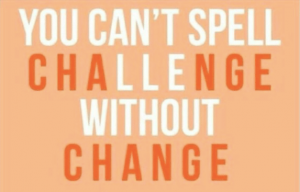I have a pop culture fascination with motivational memes: combinations of images and words that get shared on social media with the intention of inspiring – and sometimes amusing – others. This morning I enjoyed, ‘Think like a proton – always be positive’. A couple of months ago a friend shared a cheesy meme that turned out to be prescient: ‘You can’t spell challenge without change’ it declared, and was followed swiftly by an email offering me the post of Director of the Global Challenges Doctoral Centre (GCDC).

So I’m delighted to write this blogpost to introduce myself, and to share some thoughts on the changes involved in moving to work within the ‘Global Challenges’ activity that has swiftly become a key part of our impactful activities here at Kent.
This new role is a small change for me in some ways. The Graduate School (in which the GCDC is based) is just a flight of stairs up from SSPSSR where I’ve spent the last decade running the Centre on Philanthropy and teaching a Masters programme on Philanthropic Studies. My core research is focused on philanthropy and charitable giving, within which international development and humanitarian relief have long been amongst the most popular causes for UK givers. So I’m familiar with – and committed to – the importance of the UN sustainable development goals, and the urgency of addressing the challenges of economic development and well-being faced by countries named on the Development Assistance Committee list.
But it’s a big change in other ways. Philanthropy is best defined as ‘private action for the public good’, but the nature of the relationship between philanthropy (private giving) and solving global challenges (the largest stage on which the public good is enacted) is unclear and increasingly contested. The right role for private action, and how that could and should interact with action taken by democratically elected institutions, is the subject of current high profile debates. Proponents argue that philanthropic funding is uniquely free to move swiftly to tackle intractable problems with high risk outcome that elected bodies either can’t or won’t solve, whilst detractors point out the problems with encouraging unelected ‘policy plutocrats’ to intervene in other people’s lives. The debate goes on, and I’m currently writing a book exploring this topic further.
Change is also driven by the fast growth of the GCDC at Kent. We’ll soon be welcoming eight new GCDC-funded doctoral students to join the fabulous four who’ve completed their first year (such as Laura Dyball, profiled here). And the call has just gone out for the next staff-led scholarships competition as part of Kent’s commitment to recruit at least eight additional GCDC doctoral students in each of 2020 and 2021. As more colleagues across campus succeed in securing funding from the Global Challenges Research Fund (GCRF) with sterling support from Research Services, the GCDC will become an ever-more important focus for part of Kent’s GCRF-related activity.
This new era of the GCDC will be led by myself, and by Dr Frank Grundig of PolIR, who will introduce himself in a future blogpost. We know there are a large number of graduate students and colleagues on all of Kent’s campuses who share an interest in tackling global challenges. Some of these will be GCDC-funded doctoral students and their supervisors, others may wish to become affiliate members, whilst others may prefer to get involved with occasional activities, workshops and training events, or simply sign up for our e-newsletter. Please feel free to get involved in whatever way you choose – all are welcome.
Another change for me is to be working in an inter-disciplinary centre alongside colleagues from across campus. Having been here since 2006, I stepped inside a lab for the very first time last week to visit current funded students in Biosciences. It is hugely enjoyable to meet these future research stars, as well as colleagues based in many parts of the university who have helped in different ways to create and shape the Global Challenges Doctoral Centre. Whether or not you have been involved with GCDC to date, please feel free to get in touch (B.Breeze@Kent.ac.uk) if you have ideas about how best to build on this initiative and advance efforts to conduct research for the greater good.
Change is never easy, especially when the intention is to tackle some of the most intractable global challenges. But as another on-topic meme states: ‘Challenges are what make life interesting and overcoming them is what makes life meaningful’.
Image sources:
(1) https://me.me/i/you-cant-spell-challenge-without-change-if-youre-going-to-1662556

